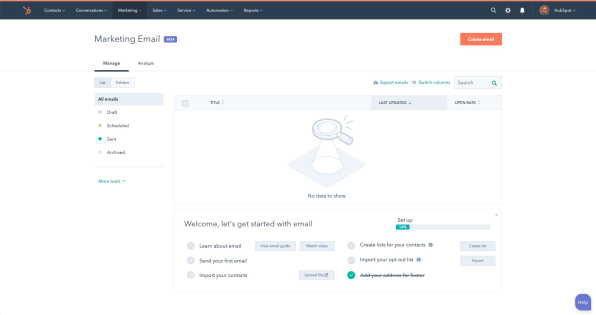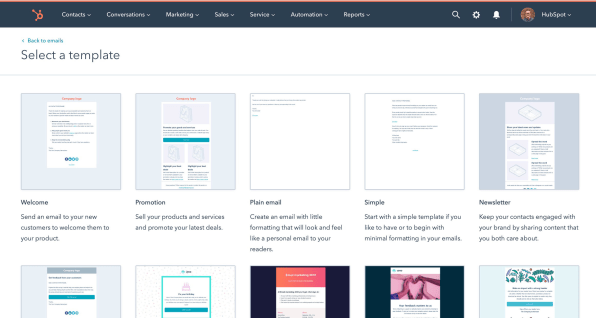Why HubSpot is introducing a free email marketing service
Users of the free version of customer relations management tool HubSpot will now be able to send up to 2,000 emails to would-be and existing customers at no cost each month, the company announced Tuesday.
The Cambridge, Massachusetts, company will also let its users manage up to $1,000 in ad spending on Facebook, Google, and LinkedIn each month as part of the free plan. It’s part of HubSpot’s strategy of offering free services to small and midsize businesses, with the knowledge that some will ultimately upgrade to its premium paid offerings, according to cofounder and CTO Dharmesh Shah.
“HubSpot has kind of an interesting history in this regard,” he says. “We started with the premium product and decided to make it free.”
The free email platform will let users visually craft emails and send them to targeted sections of their lists of customers and leads.
“I have that ability to kind of control dynamically the audience that I’m reaching,” says Thomas Berry, student outreach coordinator at Picmonic, which uses HubSpot to spread the word about its study tools for students in medical school and other health programs.

Targeted email is something many of HubSpot’s customers are likely doing with other products already, says Shah. But using email marketing that’s integrated into one platform, along with other tools like social media marketing and web hosting, can save time and headaches for users. It can mean spending less time entering passwords to log in to different tools or manually syncing data between different systems.
“We believe that email and CRM belong together, and that every marketer, no matter the size of their budget, should be able to see how their efforts are impacting their customers and, ultimately, their bottom line,” said Kipp Bodnar, CMO of HubSpot, in a statement. “We’re offering email as part of our free CRM to enable growing businesses to finally see how their efforts impact their customers’ experience beyond just a single email or interaction.”
HubSpot isn’t the only company to offer an increasingly diverse marketing platform: Mailchimp, originally best known as a platform for email marketing, has expanded into other areas lately, including social media advertising and visitor landing pages.

In addition to simplifying things for customers, HubSpot’s new offering may also be a good way to woo new users who will also sign up for more advanced services as their needs evolve.
“We . . . . see companies that say, ‘We love your email marketing but we need kind of more sophisticated automation campaigns to do sign-up flow and things like that,’” Shah says.
(39)



